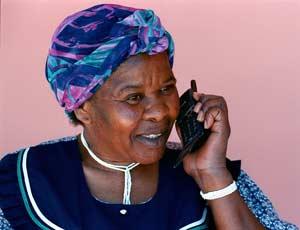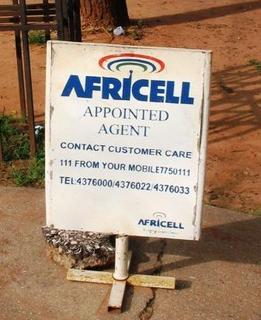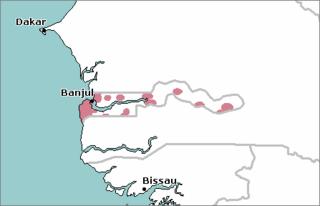Africell and Gamcell
As an pretty devoted reader (and now subscriber) to the current affairs weekly the Economist, this week I'm going to write about the most exciting and fastest growing money-making enterprise going on in Gambia at the moment, and the cut-throat competition between the two big players in the field.
I'm talking, of course, about mobile phones. The Economist seems to run an article every couple of months about how mobile phones are such a great thing for developing economies, especially African ones. Here is a snip from Economist in July of this year
"IMAGINE a magical device that could boost entrepreneurship and economic activity, provide an alternative to bad roads and unreliable postal services, widen farmers' access to markets, and allow swift and secure transfers of money. Now stop imagining: the device in question is the mobile phone. Not surprisingly, people in the developing world are clamouring for them, and subscriber growth is booming. The fastest growth rates are to be found in Africa, albeit from a low base. Already, 80% of the world's population lives within range of a mobile network; but only about 25% have a mobile phone."

The full article is at: http://www.economist.com/displaystory.cfm?story_id=4151426
The Gambia seems to be a pretty good example of the rapid rise of the African mobile phone industry: ten years ago only the telecommunications were via the hopeless government run landlines, but now there are two independent businesses competing to create the best mobile phone networks: these two companies are called Africell and Gamcell. Everywhere I've been on my fieldwork trips, I saw the advertising for these two, and every little shop in the whole country seems to sell the scratch cards for charging up your account.

This is the little advertising board for Africell that you see outside every shop selling their scratchcards - note how they have incorporated the red, blue and green of the Gambian flag into logo as the broadcast waves !
What I've found really fascinating about the mobile phone industry here is the ways in which it specially adapted to local needs. For example, Africell recently started a "Free 5kg bag of rice with every new Simcard offer", which has been very popular, especially as everyone is very hungry now in Ramadan, and will need to get lots of food together for the end-of-Ramadan celebrations.

Not sure how Gamcell are going respond to this stroke of marketing genius... maybe get the under-17 football team to endorse their product... The free market competition between these two is fun to watch, each trying to out-do the rival with cheaper prices, more offers and more advertising
Another good example of adaption to local needs comes from the handsets that are used here. The most popular ones around are some extremely robust Nokia handsets that have enormously long battery life - about 250 hours - which is useful as the power supply here is somewhat sporadic. These phones also have a built-in flashlight, again, mainly for use in the frquent power-cuts. Almost everyone uses scratchcards to charge up their phone account, and the calls are phenomenally cheap, by UK standards at least.

One major problem is coverage, especially away from the towns, but I think this is a bit of a supply-and-demand issue : they would extend the networks if there was going to be more people using them ... On map opposite, the coloured spots are where there is good coverage.
The main thing that seems to limit the spread of phones is the high cost of buying a handset: around 2500 dalasi for the phone, and 250 dalasi for the Simcard. This is about a months salary for most people here, and the high value of the phones mean that there are now specialised "phone-thieves" operating on many of the local minibuses ("bush-taxis"). As the Economist article I quoted above mentions, there is a pressing need for simple and cheap phone supply for this industry here - no need for fancy camera-phones and internet browsers, just cheap enough for every farmer, fisherman and housewife to be able to afford. Perhaps thats where some of the international aid pouring into Africa should be directed to: at least mobile phone subsidies would give people here something they really want, rather than patronising westerners (like myself) coming in and telling them how they should be running their lives ...
Anyhow. This seems to be one of my longer posts, hope you will comment if you enjoyed reading it.

2 Comments:
e' veramente bello!!!!
it's really beautiful!!!!
clara
3:16 pm
If we give them the money we should be able to co-determine where to spend all this money. And if an offer like ""Free 5kg bag of rice with every new Simcard" is successfull...I guess they need other things then mobiles!! A mobile is not a basic need such as food...
Chris
4:14 pm
Post a Comment
<< Home